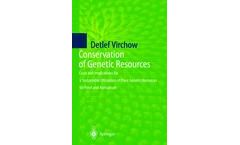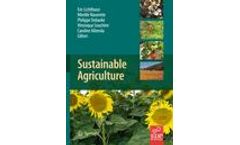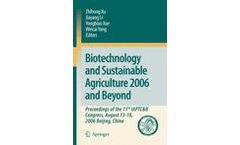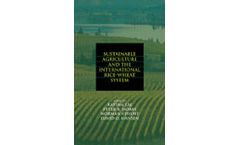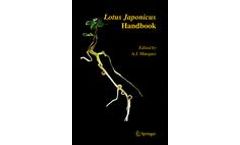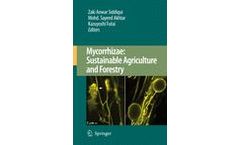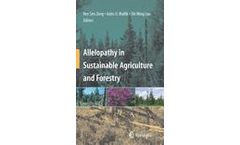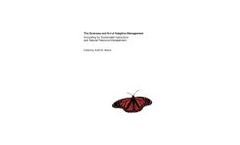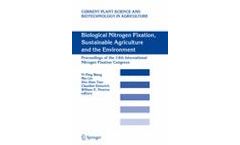Refine by
sustainable-agriculture books
45 books found
Over the past decade the importance of natural resources for sustainable agricultural development has been increasingly discussed at international forums and conferences. Aside from the sustainable management of soil, water, and air, it now seems to be accepted that the sustainable management of genetic resources is one of the ...
Sustainability rests on the principle that we must meet the needs of the present without compromising the ability of future generations to meet their own needs. Starving people in poor nations, obesity in rich nations, increasing food prices, on-going climate changes, increasing fuel and transportation costs, flaws of the global market, worldwide pesticide pollution, pest adaptation and ...
The timing is appropriate with the present interest in sustainable agriculture, in which red clover was so prominent in the past. ...
Agroforestry reserach and development in Australia has been largely fragmented and many of the research results have never been published and are unknown. The purpose of this volume is to comprehensively review all of the research that has taken place in the field of agroforestry in Australia, including previously unpublished results, providing readers with the latest technical and economic ...
Biotechnology and Sustainable Agriculture 2006 and Beyond is a collection of papers presented at the XIth international congress of the International Association of Plant Tissue Culture & Biotechnology (IAPTC&B). ...
This book represents the authors' lifetime dedication to the study of inhibitors and phytohormones as well as its practical applications for achieving a more sustainable agriculture. Their work focuses on the functions of various groups of active molecules, their direct effect upon plant growth, but also implications for their impact upon the surrounding ...
Addressing a topic of major importance to the maintenance of world food supplies, this reference identifies knowledge gaps, defines priorities, and formulates recommendations for the improvement of the rice-wheat farming system. The book reveals new systems of rice intensification and management and illustrates the application of no-till and conservation farming to the rice-wheat system. With ...
Chemical fertilizers have had a significant impact on food production in the recent past, and are today an indispensable part of modern agriculture. On the other hand, the oil crisis of the 1970s and the current Middle East problems are constant reminders of the vulnerability of our fossil fuel dependent agriculture. There are vast areas of the developing world where N fertilizers are ...
Plant based Biotechnology has come to represent a means of mitigating the problems of global food security in the twenty first century. Products and processes in agriculture are increasingly becoming linked to science and cutting edge technology, to enable the engineering of what are in effect, designer plants. One of the most successful, non chemical approaches to pest management and ...
Plant based biotechnology has come to represent a means of mitigating the problems of global food security in the twenty-first century. Products and processes in agriculture are increasingly becoming linked to science and cutting edge technology, to enable the engineering of what are in effect, designer plants. One of the most successful , non-chemical approaches to pest management and ...
Agriculture is a crucial component of the economies of many of the countries in transition from a centrally-planned to a market economy and the sector is by no means immune to the environmental and socioeconomic problems confronting the countries as a whole. The concept of sustainable development provides a convenient framework for the formulation of ...
Legumes are very important plants playing a central role in biological research. They are a key component of sustainable agricultural systems because of symbiotic nitrogen fixation and other beneficial symbiosis with mycorrhizal fungi. ...
Mycorrhizal fungi are microbial engines which improve plant vigor and soil quality. They play a crucial role in plant nutrient uptake, water relations, ecosystem establishment, plant diversity, and the productivity of plants. Scientific research involves multidisciplinary approaches to understand the adaptation of mycorrhizae to the rhizosphere, mechanism of root colonization, effect on plant ...
Simply put, allelopathy refers to an ecological phenomenon of plant-plant interference through release of organic chemicals (allelochemicals) in the environment. These chemicals can be directly and continuously released by the donor plants in their immediate environment as volatiles in the air or root exudates in soil or they can be the microbial degradation products of plant residues. The ...
Agriculture is a crucial component of the economies of many of the countries in transition from a centrally-planned to a market economy and the sector is by no means immune to the environmental and socioeconomic problems confronting the countries as a whole. The concept of sustainable development provides a convenient framework for the formulation of ...
The Sciences and Art of Adaptive Management: Innovating for Sustainable Agriculture and Natural Resource Management. This book is one of the newest additions to the SWCS publications. ...
The chapters in this Proceedings are divided into six areas of interest, reflecting the six sessions of the symposium: (1) Global patterns of carbon allocation and partitioning; (2) Managed and unmanaged ecosystems; (3) Sustainable agroecosystems; (4) Groundwater quality; (5) Genetics, physiology, and molecular biology; and (6) Contemporary methods for measuring root dynamics. The sponsoring ...
They are cost effective, ecofriendly and a renewable source of plant nutrients to supplement chemical fertilizers in sustainable agricultural systems in India. This book is written with the objective of covering the basic issues in Biological Nitrogen Fixation (BNF), such as physiology, biochemistry and molecular genetics of nitrogen ...
This careless eradication of species and genetic diversity as a result of human activities from a 'hot-spot' of diversity threatens sustainable agriculture and food security for the temperate regions of the world. ...
This volume covers all aspects of fundamental and applied nitrogen-fixation research, extending from biochemistry and chemistry through genetics, regulation and physiology to agricultural practice and environmental impact. It describes recent progress on studies of potential catalysts for nitrogen fixation; how the N2-fixing process is regulated in living cells; the use and impact of genetics and ...

